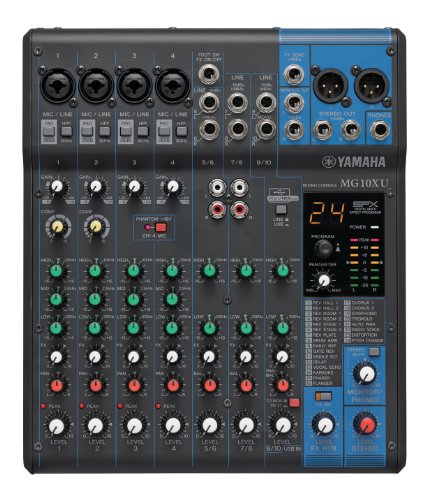Choosing your home recording hardware can be a bit tricky. There are many factors to consider; Do you want to record with two microphones-you on the vocals while your friend on the guitar? Maybe you are looking to record a live session with your four-piece band, in that case, you’ll need four or more input channels.
Another thing to consider is if you’d like to edit the output while you record, like using faders, equalizers and onboard effects, etc during a live recording or concert.
In any case, whether it’s an audio interface or mixer, investing in the right audio hardware ensures you get high-quality audio on your computer or other digital devices.
Let’s breakdown the differences between an Audio Interface vs. Mixer, so you know what you need to for your audio project. Let’s get into it.
Table of Contents
What are an audio interface and a mixer?
Audio interface

In a nutshell, an audio interface allows you to connect your microphone and other connect studio equipment to your computer. It converts an analog signal from your microphone to a digital signal on your computer. An audio interface allows connection to your computer through a USB or a firewire.
Features of an audio interface
An audio interface usually comes with input channels, a microphone pre-amp, phantom power for condenser mics, and gain/volume controls for each channel.
Audio mixer

A mixer or audio console, on the other hand, gives you more control over your audio translation that gets sent to your digital device. You have the flexibility and control over onboard effects such as onboard effects-delay, reverb, equalizers, volume faders, etc.
Features of a mixers
A typical mixer consists of XLR mic/line inputs with phantom power and stereo inputs arranged over mono and stereo channel strips. Each includes band EQ, balance/pan, level, and dedicated prefader auxiliary.
You’ll find the main outputs on two ¼” jacks and a stereo headphone output. There are a track input/output and a further mini-jack input for connecting an mp3 player. Master level controls (auxiliary, headphone, track and main), and the unit also includes a USB port for stereo recording to DAW.
Audio Interface vs. Mixer – Differences
Features and Control
Right off the bat, you see that the mixer has more features and controls than the audio interface. This gives you more flexibility on the audio that gets transmitted to your digital device. Besides, a mixer also has a built-in audio interface. It can also carry out the functions of an audio interface, albeit at an extra cost.
Size and portability
With more features comes more responsibilities. The mixer gives you more control over your audio quality, but it is big, heavy, and not easy to transport.
In contrast, though the audio interface has fewer features and controls, it is a portable and functional device. And solves your immediate audio quality needs.
Simplicity
As a beginner to audio production or recording, the barrage of buttons and controls on the mixer can prove to be difficult to use. The audio interface is simple to set up and use without much hassle.
Conclusion
Choosing between the audio interface and the mixer depends on your needs and budget. If you are a beginner in recording or music production, we recommend starting with the audio interface. It has simple and functional buttons. And if you’ve got a music production software, an audio interface is all you need to get started.
However, if you are more experienced with audio production and recording, one reasonably priced audio mixer to consider is the Samson MixPad MXP124FX. This mixer is relatively portable. It gives you multiple controls and functionality, especially for a live set. It also assures quality audio. Since the mixer has an in-built audio interface while giving you more flexibility and control over your audio, I reckon it would be worth shelling out a few dollars on it.
We would love to entertain your questions or comments in the comment section. And shoot us any suggestions for the best audio interface or mixer in the market.